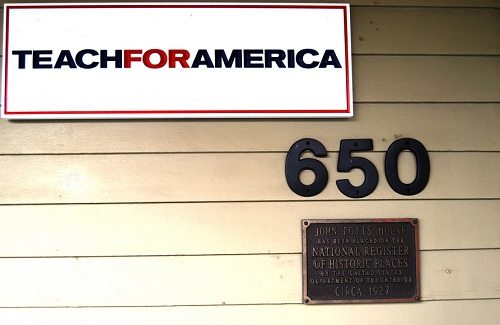
May 9, 2012; Source: Education Week
Teach for America is typically flooded with job applicants from top colleges and universities, but according to Chanté Chambers, the managing director of recruitment at historically black colleges and universities at the New York City-based Teach For America, the high-profile teaching nonprofit isn’t flooded by male applicants. She says that low status of education is “definitely a barrier,” especially among African American men.
Nationally, according to the U.S. Bureau of Labor Statistics (BLS), the Teach for America difficulty reflects the overall problems of men in the teaching profession, particularly in the lower grades. The BLS reports that the percentage of male teachers has fallen from 19.1 percent to 18.3 percent between 2007 and 2011 for elementary and middle school teachers, and from 2.7 to 2.3 percent for preschool and kindergarten teachers.
Sign up for our free newsletters
Subscribe to NPQ's newsletters to have our top stories delivered directly to your inbox.
By signing up, you agree to our privacy policy and terms of use, and to receive messages from NPQ and our partners.
Is it really the status and image of teaching or something else? Some suggest that it is the continuing sexism in the U.S. that causes society to look down on men who work with young children. TFA’s Chambers gives another explanation, arguing that African American men face “pressure to be that breadwinner, to have financial stability…to make six figures so they can give back to their communities in a meaningful way.” According to Bryan Nelson, the executive director of the Minneapolis-based nonprofit, MenTeach, “If we started paying elementary teachers $150,000 a year, we’d see a massive influx of male teachers, but if it were just money, the proportion [of male teachers] would be the same in secondary and elementary schools, and that’s not the case.”
Teach for America is one of a number of newish entrepreneurial groups suggesting that the school systems haven’t been recruiting the right people from the best schools, and that the unions in public schools and the rules of training and experience deter high-performing candidates. TFA recruits candidates without teacher training credentials, provides a short-term training experience, and places their recruits into classrooms for stints that are often only a couple of years before the newly minted teachers move on to some other fields. While TFA offers soft criticism of the traditional teacher education, training, and skill sets, does TFA’s approach less traditional approach contribute to some diminution of the teaching profession?
Without talking about TFA, but citing other factors such as the big movement toward state testing, Shaun Johnson, a former Washington, D.C. teacher who is now an assistant professor of elementary education at Towson University, suggested, “Teacher bashing is a new national pastime … and [one] which you could argue is highly gendered.” Certainly, some of the teachers’ unions have not taken kindly to the TFA model and approach.
However, in TFA’s favor, according to Education Week, Chambers said that the program is doing better than the national averages in its recruitment of male teachers. In 2011, she said, the composition of TFA’s 5,100 first-year teachers was 28 percent male, including 3 percent African American men. Perhaps she meant only kindergarten, elementary, and middle school teachers, because the BLS suggests that men comprise 42 percent of high school teachers. The critical measures may be, as TFA is suggesting, the composition of first-year teachers and, we would add, the proportions of male teachers recruited in the public schools and in TFA who choose to stay in the teaching profession.
So what do you think? Does the Teach for America model help increase the proportion of men, particularly African American men, who choose to take up the profession of teaching? Are there aspects of the TFA message or approach that, perhaps unwittingly, contribute to lowering the status of the teaching profession? Or is the issue really one of salaries and gender stereotypes that may be unlikely to change even with the demand and openings for teachers during this recession?—Rick Cohen













